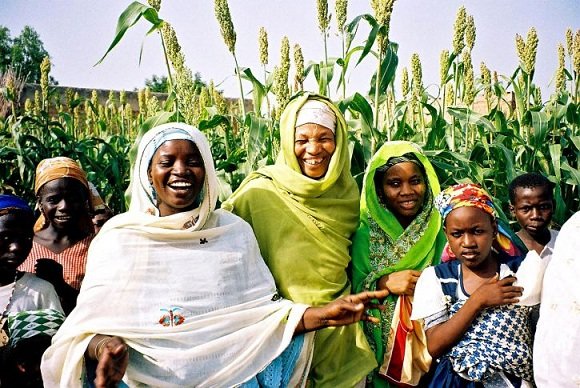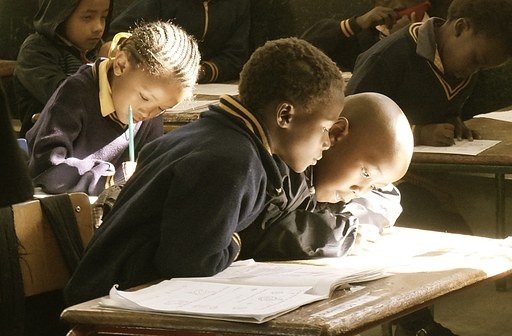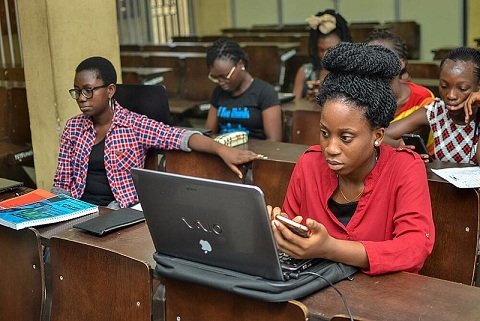ADSactly History : Emergence Of Nigeria As A Political Entity [Part 4] - Educational System Of Nigeria
Hello buddies, welcome again to another history journey of Nigeria; the Africa's most populous nation. We have looked extensively at colonialism, amalgamation process and independence in our last episodes. However, there's one area we haven't touched yet and that's the educational sector. Here, we will look at the educational system of Nigeria and its development in the pre-independence and post-independence era.

Nigerian Educational System In Relation To National Development
You will agree with me that there is a correlation between the development of any nation and their educational system. Without missing words, education plays a very pivotal role in the development of any other sector in any nation and not just in Nigeria. Come to think of this; the great philosophy of both Egyptian and Greek descent were able to achieve posterity because the philosophers passed on their knowledge to the next generation through the system of education.
However, in Nigeria, before the colonial era and even before the contact with the wider world (the western world), the system of education was majorly informal. That is; the conventional classroom setting was largely uncommon, and the major part of the education was to acquire skills which included hunting, blacksmith, fishing etc. These skills acquired vary from community to community and on the overall, each community was self-sufficient even without formal education.
When contact was made with the missionary in the early 19th century, they brought many things with them, among them was the first formal school system. The first primary school established was done in 1843 by the Methodist Missionaries. By the mid 19th century (1859 to be precise), the first secondary school in Nigeria was established; CMS Grammar School; by the missionaries.
This was how the trail of modern education and schooling started in Nigeria. One thing to note about these early schools system was that, even though it brought formal education in Nigeria, the school however maintained a semi-formal system that time - this is because it was not completely void of moral indoctrination. However, it was free, as the missionaries bore the cost of running the school system.
Well, the school system quickly spread and gained mass adoption both from government and private individuals. More schools were created and the school system tilted more to becoming more formal and more specialized and also tailored to meet the needs of Nigerian populace.

However, many of the sectors of the economy were headed by foreigners - of course, that was prior to the independence of Nigeria.
Nigerian Educational System After the Independence
By the time Nigeria gained her independence, they soon realized their inadequacies in the educational sector and their gross lack of qualified academians and experts to handle both the educational sector and other sectors. This was the reason they sought ways to create a standardized system of education that will fall in place with the needs of the nation and the development of Nigeria.
In view of this, in the year 1969 (9 years after independence), Nigeria organized her first edition of the National Conference on Education, where the education curriculum was drafted to be used in schools. A new education policy was made and the education roadmap was created. Parts of the roadmap included (among others) -
- Creating an enabling environment and right values in the educational sector
- Training the trainers to extend the leverage of formal education
- Provision of instructional materials to facilitate learning, so as to impact positively on the nation.
There was no doubt, the education convention was a huge success and it marked a turning point in the educational sector of Nigeria.

As at today, Nigeria is host to over 150 higher institutes of learning (Universities, Polytechnics/Monotechnics, Colleges of education, etc), large number of secondary, primary, and nursery schools; these are all traceable to the success of the education convention. Asides that, Nigeria has produced world leaders, record breakers and pace setters, both in educational sector and other sectors - all thanks to the advancement made from the National Education Convention.
From history, you will agree with me that steady progress has been made in the educational sector. In 1981, a system of education called 6-3-3-4 was adopted. What this means is that, on the average, a child's duration in primary school should be 6 years, then they'll spend 6 years in secondary school (which will be divided into: 3 years each for junior and senior secondary schools respectively), then 4 years for the University education. Even though these figures may slightly vary (especially the duration in University), but on the overall, it led to a major boost in the educational system of Nigeria.
Authored by @samminator
Click the coin below to join our Discord Server
)
Great post, a topic of vital importance for any country to discuss un depth. As an ex-college professor, I can categorically affirm that the main reason Venezuela felt so deep in this disastrous hole was because the so-called revolution made sure they'd destroy the educational system first.
I wonder how separate is politics from education in Nigeria, especially at college/university levels.
There is no question about the tremendous boost education has given to most African nations. During the time I spent in the States I met scholars from every African country. Brilliant men and women wirh great plans for their countries.
Much has been criticized about Colonialism, but I think the ex-colonial powers (which we can still argue excercise post/neo colonial control) have provided and shared with the ex colonies the tools needed for their development.
How those tools have been used through their ed systems is a different story.
Actually, politics and education are almost interwoven. Quite a number of universities here are owned by government. Even the private institutions are party controlled by government. So I can say that the educational system is part of the Nigerian politics.
Thanks a lot buddy, Prof Henry
:) I have not felt like a prof in months now.
If that is the case, I hope Nigeria can take some measures to veer towards a different direction. Politics killed our ed system, the dirty ideologization, to be more exact. The State desre to control everything saw in our universities potential enemies (because of the whole free-thinking concept). They were right in fearing free-thinking and they did what totalitarianism does best: they made sure universities would kneel and beg for every penny.
Thus, good bye to research, progress, innovation, global interconnections, corporate partnerships, etc.
That progressive soffucation of the university's financial and intellectual freedom turned them into big school totally dependent on "daddy State". When the government decided to neutralize them they just intervene every single thing, form student unions to faculty unions to insurance and retirement funds.
You have really touched so many vital issues to the history of education in Nigeria. No Nation can developed when it neglect a sound education system. Thanks for the colonial masters or rather the missionary to be specific who demmed it fit that light must come to Nigeria, we have the Light through education.
This is where my concern now lies, our political leaders don't believe in our education system anymore and that is why they don't allocate the minimum requirement of budget by the global standard. They send their own children to school in foreign countries leaving our country education system to collapse while they aid other countries to make money from us. I hope that we will improve on what was left behind by the nationalist.
Thanks @adsactly and @samminator for this wonderful write up, i have been following this for some time now.
I believe we have every resource in Nigeria to make our educational system to be world class, but you know, mixing politics and education isn't always the right panacea. In my opinion, I think educational system should assume full autonomy.
Thanks buddy
@samminator, Every nation look for the Development, more developments which will going to fill the gap. Definitely Nigeria travelled a journey and achieved this point of Growth. Stay blessed.
Posted using Partiko Android
Sure, I agree with you that every nation needs development.
Thanks a lot @chireerocks
Welcome and have a pleasant time ahead.
Posted using Partiko Android
There's so much analogy between countries. I agree with you when you say that education and development go hand in hand. Education must be a right in all nations. An educated country has intelligent, hard-working, forward-thinking citizens who are difficult to manipulate. Perhaps that is why, when dictatorial governments arrive, they attack education. In the case of Venezuela, until the end of the last century, we had a first class education, schools equipped with materials and scholarship and improvement plans for students and teachers. Meritocracy existed, as did professionalization. With Hugo Chavez, everything went down the drain. This generation of young people see no sense in educating themselves. It is very sad and dark the future of a country if it is not educated. Excellent work, @samminator.
No doubt, any country that lays less emphasis on education has totally excluded itself from development. I think every country should seek for more development in education, and it will brighten up other sectors.
Thanks a lot Nancy
Education is unquestionably an essential issue for the development of every society and nation. No modern society will be able to make real and solid progress without a strong and stable educational system. As far as you can tell, @samminator, Nigeria has made good progress in deploying its education system. First of all, part is owed to the missionaries who introduced formal education. And then to the seemingly accurate policies of post-colonial and democratic governments. There are very good basic criteria and a coherent structure of pursuit. May it be maintained and perfected, and not as in my country (Venezuela), where, since the establishment of the authoritarian socialist regime that we have, our educational "system" has become a chaos and its quality is increasingly diminished, after having had one of the most advanced educational systems in Latin America.
Thank you for your post, @samminator.
Your first statement summarizes the entire post. The development of any nation is heavily dependent on their education system.. I hope they'll understand this.
Thanks a lot buddy Jose
This is indeed a great and lovely post. I love the effort and time you putting in to this and how you talked about the educational stuff in a more interesting manner.
What really caught my attention is how the educational system has moved from the hands of our colonist down to this present era. I won't want to draw hypotensis between their educational reign and our present reign, but am glad we all have achieved a great height.
One thing caught my attention, I love where you mentioned the 6-3-3-4 system, it looks like a football team formation, lol kidding. I really love that system but it varies at times @samminator
Thanks once again for this great work bro
It is a great experience reading about the educational development of Nigeria nation. I appreciate this deep research work Cuz as a Nigerian I don't know much about how our current curriculum was drafted but this article is quite very helpful. It therefore means that tertiary institutions were founded in Nigeria in the post independent era; really?
Many thanks to the missionaries for the crucial roles they played in the development of our educational system. SHALOM!
I quite agree with the statement you made that education has a correlation with development. I really hope our political leaders will look into ways to further enhance our standard of education.
Nice piece @samminator
Hi, @adsactly!
You just got a 0.32% upvote from SteemPlus!
To get higher upvotes, earn more SteemPlus Points (SPP). On your Steemit wallet, check your SPP balance and click on "How to earn SPP?" to find out all the ways to earn.
If you're not using SteemPlus yet, please check our last posts in here to see the many ways in which SteemPlus can improve your Steem experience on Steemit and Busy.
Informative post again. I believe the education system of Nigeria has produced world class leaders in the past but how about the present? Is the education system still growing at that pace? In my opinion, we need more vibrant leaders in the educational sector.
Nice piece @samminator